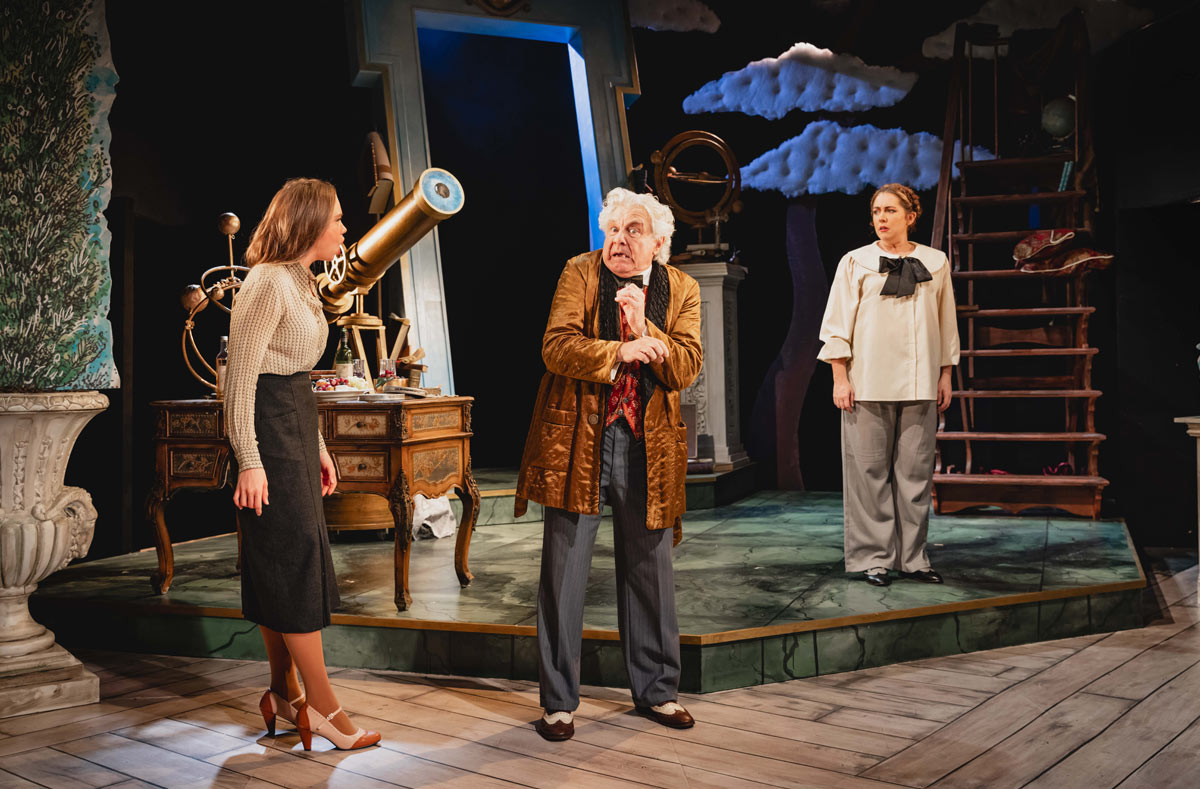Review: THE FABULIST at Charing Cross Theatre
These days, Giovanni Paisiello’s name will only be known to the most ardent of Opera buffa/Commedia dell’Arte aficionados. However, during his lifetime he was celebrated as one of the greatest living composers, enjoying considerable royal patronage, fame and renown. Eclipsed by the likes of Rossini and Mozart his work is rarely performed today, but the music for his opera The Imaginary Astrologer has been used by James P Farwell in creating THE FABULIST.
 The cast of The Fabulist at Charing Cross Theatre. Photo by Mark Senior.
The cast of The Fabulist at Charing Cross Theatre. Photo by Mark Senior.
The romantic comedy musical operetta (let’s cover our bases here), is set in Italy soon after the Fascist Dictator Benito Mussolini signed the Concordat with the church in the late 1920s, giving it greater control and powers over cultural matters and the State Education system. Our comic hero Julian (also Agrofontido) is a travelling magician — the fabulist of the title — who, with his sidekick Pupuppini stumbles upon a film set where sisters Cassandra and Clarice - director and screenwriter respectively, are cobbling together a Trojan epic. Their stargazer/scientist father Count Petronius wants both of them married off, but only to respectability and money. His brother Cardinal Bandini is on a mission to rid the world of heretical magicians. You get the jist. Plenty of romping around, disguises, corny jokes and opportunities to de-rail the course of true love.
It is perhaps unsurprising to learn that Dan Smith in the male lead of Julian has spent a considerable part of his career performing in pantos. He could certainly rein-in some of the more slapstick delivery in this small space. Having said that, with the help of subtly reduced lighting, he exhibits quite a gift with the magic tricks — albeit they will be familiar to most attendees, they still elicit a certain awestruck silence when he performs them to the hushed and appreciative audience. Réka Jónás as Clarice demonstrates her considerable skills with trills but proves most effective when balancing her power of projection with Cassandra Lily de la Haye, particularly in the closing sections and notably Sister, Pursue Your Dreams.
West End veteran James Paterson exhibits an affable ineptitude as the Count trying to control and persuade his daughters to obey his wishes, whilst Stuart Pendred (when staging permits) delivers the colourful Cardinal with the baritonal gusto indicative of a performer who knows his way around an opera stage. Lastly, Constantine Andronikou perhaps due to his physicality, clearly knows when an element of stillness is required to extract the most from his key moments as Pupuppini. He is every inch a consummate concert performer and as such, manages to land most of his comic lines successfully — which is not always the case elsewhere in proceedings.
Returning to the writing and direction, it would be remiss not to point out the obvious stylistic parallels with Gilbert and Sullivan — although WSGilbert might have had something to say about the rhyming couplets. Farwell (when he is not busy advising the US and UK military on cyber warfare and strategic comms), is clearly an extremely gifted amateur writer with a love for the genre. Director John Walton, has deployed something of an Edinburgh Fringe/Footlights feel to proceedings and manages to make good use of the space. Finally, ensuring everyone remains (largely) in time and in tune, the six members of the orchestra overcome the inherent acoustic limitations of being above the action, and deliver a rendition of Paisiello’s jaunty music of which he would undoubtedly have approved.
Latest News

 Review Round-Up: OH, MARY! at the Trafalgar Theatre
19 December 2025 at 15:53
Review Round-Up: OH, MARY! at the Trafalgar Theatre
19 December 2025 at 15:53

 The Jonathan Larson Project announces London premiere
19 December 2025 at 10:31
The Jonathan Larson Project announces London premiere
19 December 2025 at 10:31

 Oh, Mary at Trafalgar Theatre Review
19 December 2025 at 09:46
Oh, Mary at Trafalgar Theatre Review
19 December 2025 at 09:46

 Kerry Ellis completes cast for West End concert of Jo - The Little Women Musical
19 December 2025 at 09:35
Kerry Ellis completes cast for West End concert of Jo - The Little Women Musical
19 December 2025 at 09:35